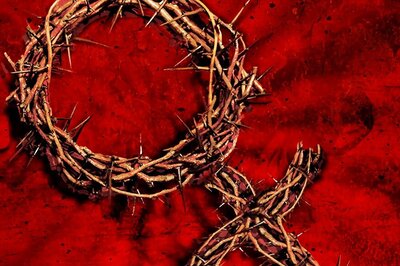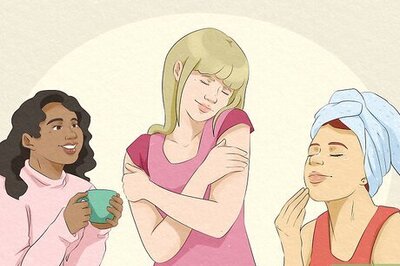
views
Srinagar: The alleys leading to the main road are manned by paramilitary and police personnel. Barricades have been placed at about every 500 meters, with coils of concertina wire spread across. At places, trucks of paramilitary troops and police are placed like a wall, barring not only the movement of the people but the sight on other side.
This is the view of Zadibal locality in the downtown Srinagar area. Shia-Muslims, who inhabit the majority population in the area, are observing Muharram just like the community across the world observes the martyrdom of Prophet Muhammad’s grandson 1,400 years ago.
Black flags and the banners with prayers have been put up on the road sides and streetlights. The area appears swathed with the ensigns of Muharram. But the roads and alleys, which used to be abuzz with thousands of believers—draped in black dresses—appear forsaken. The only sight apparent is the forces manning the barricades and not allowing cars, two-wheeler and, at times, even people to pass through.
This kind of restriction during Muharram, as per locals, has never been imposed before, even in the difficult times of 1990s or after that.
“We are not being allowed to even fetch medicine and necessary commodities,” said 70-year old, Ghulam Hussain, a retired government officer. Hussain was born in this locality and grew up here but the restrictions imposed this time are “exceptional”.
Earlier, large processions would take place in the Valley during Muharram. But the practice was banned in 1989 as militancy broke out in Kashmir. These religious processions would convert into anti-India protests. However, large processions would be allowed in all Shia-majority areas of Srinagar, Budgam and Baramulla.
But this time no procession is being allowed, even within the small localities.
Ashura—which is on Monday—is the 10th day of the mourning and most revered day for the Shia community. However, authorities have imposed complete restrictions and no processions will be allowed.
Looking at the prevailing situation and the strict curbs imposed by the administration, the people in past days decided to take out small processions within the localities, not moving to the main roads. By Sunday, security forces had banned even small gatherings.
Locals alleged that police resorted to the teargas shelling and pellet firing to disperse the mob.
“We were taking the procession within the alleys of the locality. The police even escorted the people for some distance but then teargas shells and pellets were fired,” said Tanveer Pathan, an elected corporater of the Srinagar Municipal Committee.
Pathan alleged that even police are looking for him. “They want to arrest me. I had to go in hiding for many days,” he told News18.
The locals also accused police of beating some young kids who were distributing water at the stalls put out for the public.
Like mainstream politicians and the separatists who have been arrested, after government abrogated the special status of the J&K, and divided the state into the two union territories, a number of Shia leaders and clerics have been arrested and remain in the detention since then.
The people see these restrictions as a curtailment of the religious freedom. “If thousands of pilgrims can visit Amarnath cave and government can provide security to them, why can’t we take out the procession?” said a local.
The administration believes that allowing Muharram processions can lead to law and order situation as Kashmir valley is already under restrictions since over a month. “We cannot allow people to assemble. There are mischievous elements who are always ready to create trouble,” said a police official wishing anonymity.
However, locals say that the taking out processions is part of their faith and it has nothing to do with the political situation prevalent in the Valley. “We are not throwing stones. It is our religious right. In any free democracy we can practice our religion,” said Tanveer Pathan.




















Comments
0 comment